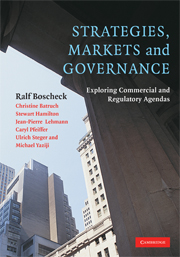Book contents
- Frontmatter
- Contents
- List of Figures, Boxes and Tables
- Acknowledgments
- Preface
- Notes on Contributors
- Part I Introduction and overview
- Part II Firm-level
- Part III Industry-level
- Part IV Country/International level
- 13 Governing oil supply: Fiscal regimes, NOCs and the steering of resource-based economies
- 14 China – External imperatives and internal reforms
- 15 EU constitutional governance: Failure as opportunity!?
- 16 One competition standard to regulate global trade and protection?
- Part V An observation in closing
- Index
15 - EU constitutional governance: Failure as opportunity!?
Published online by Cambridge University Press: 06 July 2010
- Frontmatter
- Contents
- List of Figures, Boxes and Tables
- Acknowledgments
- Preface
- Notes on Contributors
- Part I Introduction and overview
- Part II Firm-level
- Part III Industry-level
- Part IV Country/International level
- 13 Governing oil supply: Fiscal regimes, NOCs and the steering of resource-based economies
- 14 China – External imperatives and internal reforms
- 15 EU constitutional governance: Failure as opportunity!?
- 16 One competition standard to regulate global trade and protection?
- Part V An observation in closing
- Index
Summary
On June 17, 2005, the European Union summit broke up in a bitter dispute over the EU's budget and the future of its constitution. Arguments about the union's financial plans, even sullen accusations of national egoism, have been a frequent element of European politics for years. But the popular rejection of the proposed EU constitution by France and the Netherlands, two major advocates of European unity, just prior to the meeting had raised deep questions about the Union's legitimacy and purpose. Hopes by some that successful ratifications in the remaining EU countries would change the French and Dutch stance were soon dispelled. Already at the summit, the Dutch prime minister announced that his country would not vote again on the same, unamended document; Denmark, Portugal, Ireland, Britain and the Czech Republic put their referendum schedule on hold. Nearly fifty-five years since the beginning of the European voyage, attempts to reach the EU's “final and natural constitutional destiny” appeared to have thrown the Union off course and into “one of the deepest crises in its history.” Or, is Europe facing a unique opportunity for political, economic and institutional renewal?
By way of introduction, section 1 of this chapter briefly sketches some elements of the EU's current economic status, its institutional aspirations and Realpolitik, and the range of challenges that a European constitution was envisioned to meet. Section 2 outlines key considerations for assessing the origin and performance of constitutional governance and the political economy of federalism.
- Type
- Chapter
- Information
- Strategies, Markets and GovernanceExploring Commercial and Regulatory Agendas, pp. 277 - 300Publisher: Cambridge University PressPrint publication year: 2008



